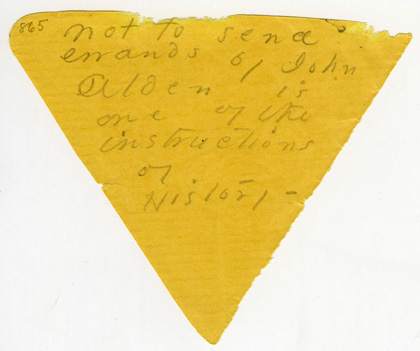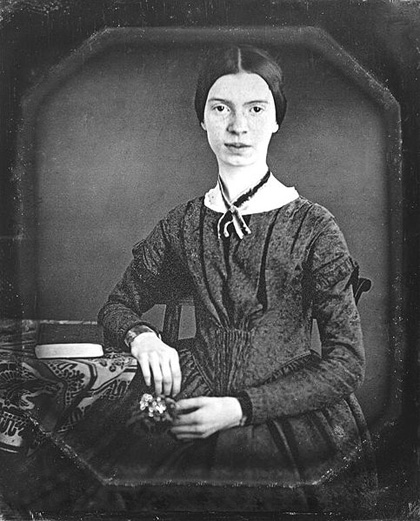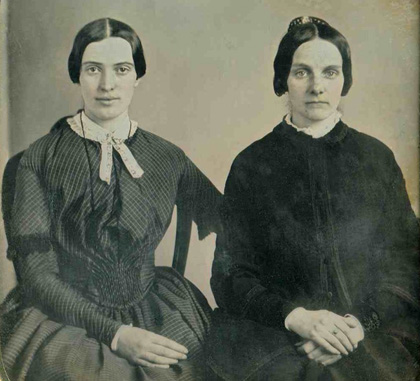---------------------------
• Augusto de Campos
---------------------------
67
O Sucesso é mais doce
A quem nunca sucede.
A compreensão do néctar
Requer severa sede.
Ninguém da Hoste ignara
Que hoje desfila em Glória
pode entender a clara
Derrota da Vitória.
Como esse — moribundo —
Em cujo ouvido o escasso
Eco oco do triunfo
Passa como um fracasso!
67
Success is counted sweetest
By those who ne'er succeed.
To comprehend a nectar
Requires sorest need.
Not one of all the purple Host
Who took the Flag today
Can tell the definition
So clear of Victory
As he defeated — dying —
On whose forbidden ear
The distant strains of triumph
Burst agonized and clear!
(c. 1859)

Reprodução fotográfica de um dos poemas-envelope de Emily Dickinson: não confiar tarefas a John Alden, escrito por volta de 1880
288
Não sou Ninguém! Quem é você?
Ninguém — Também?
Então somos um par?
Não conte! Podem espalhar!
Que triste — ser — Alguém!
Que pública — a Fama —
Dizer seu nome — como a Rã —
Para as palmas da Lama!
288
I'm Nobody! Who are you?
Are you — Nobody — Too?
Then there's a pair of us!
Don't tell! they'd advertise — you know!
How dreary — to be — Somebody!
How public — like a Frog —
To tell one's name — the livelong June —
To an admiring Bog!
(c. 1861)
642
Banir a Mim — de Mim —
Fosse eu Capaz —
Fortim inacessível
Ao Eu Audaz —
Mas se meu Eu — Me assalta —
Como ter paz
Salvo se a Consciência
Submissa jaz?
E se ambos somos Rei
Que outro Fim
Salvo abdicar-
Me de Mim?
642
Me from Myself — to banish —
Had I Art —
Impregnable my Fortress
Unto All Heart —
But since Myself — assault Me —
How have I peace
Except by subjugating
Consciousness?
And since We're mutual Monarch
How this be
Except by Abdication —
Me — of Me?
(c. 1862)
1222
O Enigma decifrado
Despreza-se com pressa —
A Surpresa de Ontem
Já não nos interessa —
1222
The Riddle we can guess
We speedily despise —
Not anything is stale so long
As Yesterday's surprise —
(c. 1870)
 Foto oficial — e única — de Emily Dickinson: daguerreótipo produzido quando a escritora tinha cerca de 16 anos
Foto oficial — e única — de Emily Dickinson: daguerreótipo produzido quando a escritora tinha cerca de 16 anos
-------------------------------
• Aíla de Oliveira Gomes
-------------------------------
389
Houve morte na casa ali defronte —
Foi hoje, coisa recente;
Eu sei por esse ar de anestesia
Que dessas casas recende.
Vizinhos em sussurros entram e saem,
De carro afasta-se o médico,
Uma janela se abre como vagem,
De modo abrupto, automático,
E por ela atiram fora um colchão.
Crianças passam correndo —
Intrigadas — "foi ali que morreu?"
Eu ficava assim, me lembro.
Formal e teso vai entrando o clérigo,
Qual se sua a casa fosse —
Hoje são dele todos os que choram
E das crianças toma posse.
Vem o homem do armarinho — e aquele homem
Da horrorosa profissão —
O que toma as medidas para a casa.
Vai haver a soturna procissão —
Vão vir os coches, as franjas douradas
Sem nem cartaz ou rumor,
Corre fácil a intuição das notícias
Nas vilas do interior.
(c. 1862)
389
There's been a Death, in the Opposite House,
As lately as Today —
I know it, by the numb look
Such Houses have — alway —
The Neighbors rustle in and out —
The Doctor — drives away —
A Window opens like a Pod —
Abrupt — mechanically —
Somebody flings a Mattress out —
The Children hurry by —
They wonder if it died — on that —
I used to — when a Boy —
The Minister — goes stiffly in —
As if the House were His —
And He owned all the Mourners — now —
And little Boys — besides —
And then the Milliner — and the Man
Of the Appalling Trade —
To take the measure of the House —
There'll be that Dark Parade —
Of Tassels — and of Coaches — soon —
It's easy as a Sign —
The Intuition of the News —
In just a Country Town —
1071
A percepção de um Objeto custa
Justo a perda do Objeto.
A percepção é, em si mesma, um ganho
Respondendo por seu preço.
O Objeto Absoluto — é nada —
A Percepção é que o revela —
Depois censura a Perfeição
Que tão longe se encastela.
1071
Perception of an Object costs
Precise the Object's loss —
Perception in itself a Gain
Replying to its Price —
The Object Absolute — is nought —
Perception sets it fair
And then upbraids a Perfectness
That situates so far —

Foto recém-descoberta que se acredita ser de Emily Dickinson (à esquerda). A outra mulher, disso não há dúvida, é Kate Scott Turner Anthon, uma amiga. A data: 1859, quando Emily tinha 29 anos
-----------------------
• Isa Mara Lando
-----------------------
80
Nossas vidas são Suíças —
Tão quietas — tão Frias —
Até que uma tarde vem —
Soltam os Alpes as suas Cortinas,
E espiamos além!
A Itália fica do outro lado!
Como guardas, porém,
Os Alpes solenes
Os Alpes sirenes
Para sempre intervêm!
80
Our lives are Swiss —
So still — so Cool —
Till some odd afternoon
The Alps neglect their Curtains
And we look farther on!
Italy stands the other side!
While like a guard between —
The solemn Alps —
The siren Alps
Forever intervene!
1763
Fama, o que é?
Como abelha, vai e vem —
Tem canção —
Tem ferrão —
Ah, tem asa também.
1763
Fame is a bee.
It has a song —
It has a sting —
And, too, it has a wing.
182
Se eu não estiver mais viva
Quando vierem os Passarinhos
Dá ao de Lencinho Carmesim
Uma migalha, por mim.
E se eu não te agradecer
Imersa num sono infinito
Saiba que o tento fazer
Com meu lábio de Granito!
182
If I shouldn't be alive
When the Robins come,
Give the one in Red Cravat,
A Memorial crumb.
If I couldn't thank you,
Being fast asleep,
You will know I'm trying
Why my Granite lip!
108
Tem cuidado, cirurgião
Ao tomar o bisturi!
Sob a tua fina incisão
Se agita a Culpada — a Vida!
108
Surgeons must be very careful
When they take the knife!
Underneath their fine incisions
Stirs the Culprit — Life!


Nenhum comentário:
Postar um comentário